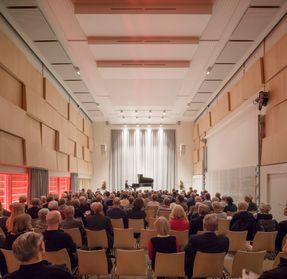
Vendsyssel Theatre
ARCHITECTS
Schmidt Hammer Lassen Architects
ENGINEERS
Brix & Kamp A/S, ALECTIA A/S
CLIENT
Hjørring Municipality Realdania
LANDSCAPE ARCHITECT
LIW Planning Aps
PHOTOGRAPHS
Adam Mørk
OTHER CONSULTANTS
Gade & Mortensen Akustik A/S; AIX Arkitekter AB; Filippa Berglund, scenography, architect maa
AREA
4200 m²
YEAR
2017
LOCATION
Hjørring, Denmark
CATEGORY
Theater
Text description provided by architect.
A successful premiere marked the beginning of a sold out season at Denmark's first newly built theatre in over a century outside of the Danish capital Copenhagen.
The 4,200 m2 theatre and culture building is designed as a dynamic and multifunctional complex that includes a Music hall, Black Box, Rehearsal hall and a 430 seat flexible hall which includes an"in-the-round" theatre.
In addition, the building houses offices and spacious lobby area with café and backstage area with workshop and dressing rooms.
With its central location in the heart of Hjørring, the theatre will become a dynamo for the entire region's cultural life.
The building appears as a composition of cubic blocks.
The warm rusty red corten steel facades correspond with its surroundings during the day.
Whilst the LED backed frosted glass facades illuminate in various colors during the evening.
Thus, creating an aesthetic link between the town, the front plaza and the theatre building.
"It is our ambition that the building will manifest itself as a new living organism in the cityscape," says Founding partner John Foldbjerg Lassen.
"It is a building which stands by its cultural significance and which dares to be different without taking focus away from the town's existing qualities."
Architectural, functional and experiential emphasis has been placed on five main themes: Anchoring in the town, transparency, functionality, flexibility and materiality.The result is a striking building, which relates pragmatically to its function and which invites both active use and quiet breaks.
The approach to the building's design has been a pragmatic view of culture as an opportunity and experience for all.
Therefore, space has been created for both scheduled and ad hoc events outside at the plaza, inside the foyer and on the grand staircase where visitors can choose to be spectators or even participate in the activities.
Inside, an open plan solution ensures visual and physical connections across the building. The boundaries between publicly accessible areas and the more traditional theatre functions are blurred.
Inside, all the major halls can be opened to the foyer, the use of glass and windows in different rooms creates visual connections and the performers can get a glimpse of the public from their lounge on the top level."

























